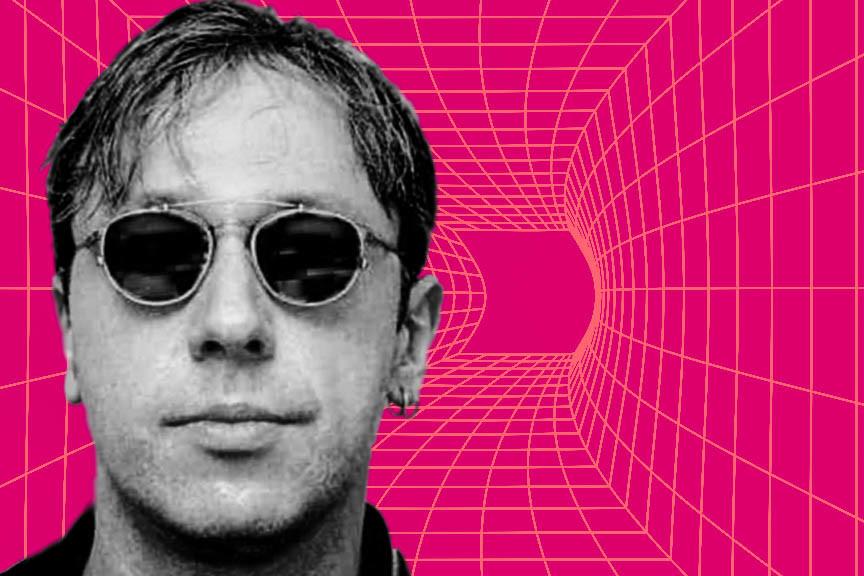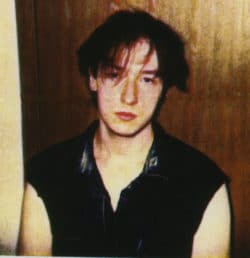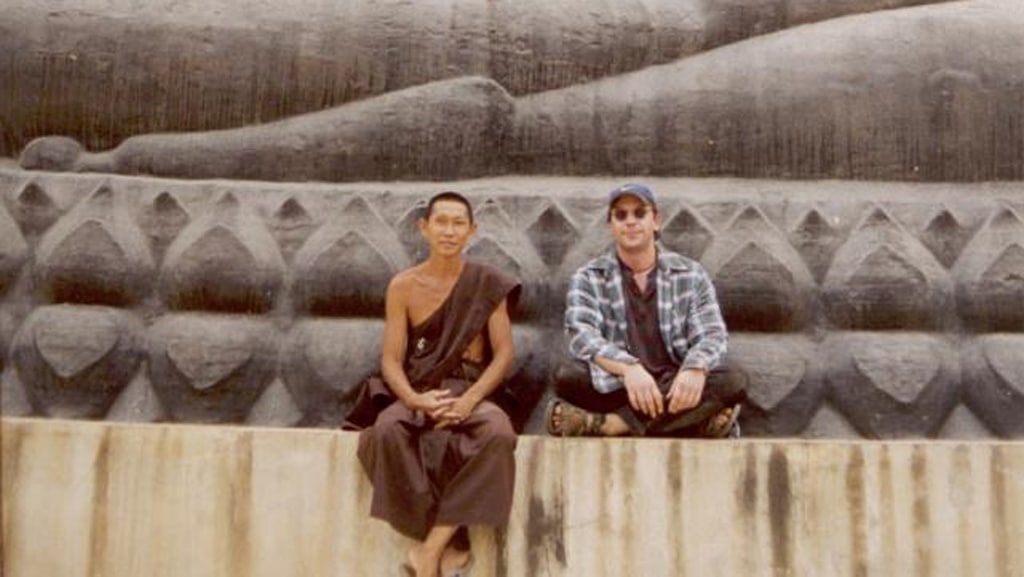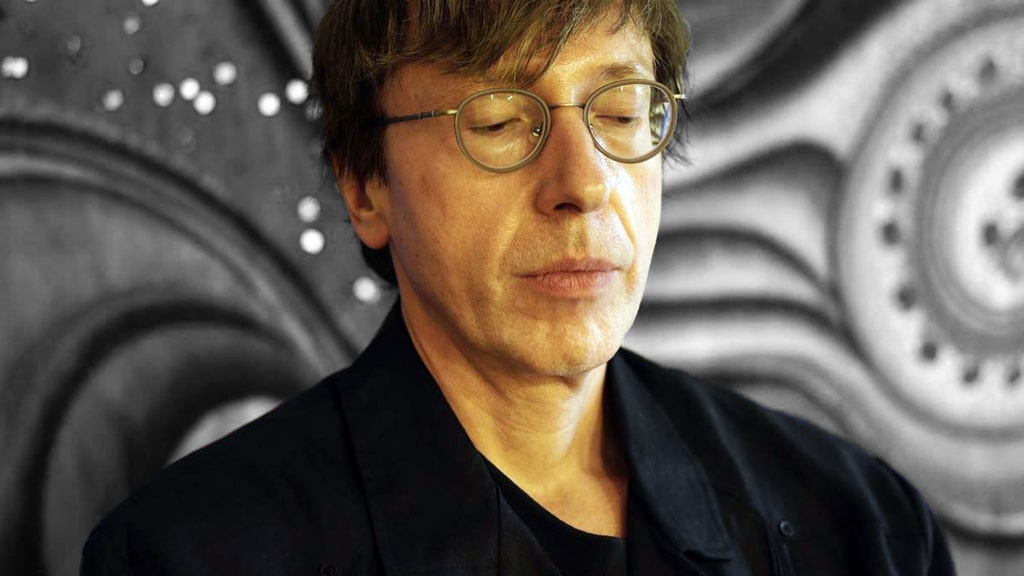Patrick Kroupa, hacker and ex-heroin ‘junkie’, on microdosing and the medicalization of ibogaine | Part 6
“My experience with heroin went from age 14 up to age 30, and taking ibogaine was as close to a miracle as I have ever experienced in my life.” Read the full series.

Psymposia is a 501(c)(3) nonprofit research and media organization that offers critical perspectives on drugs, politics, and culture. We rely on contributions from our readers and listeners. Your support is vital to sustaining Psymposia.
Support Psymposia’s independent journalism on Patreon and help us drive the Mystery Machine! We’re a bunch of meddling kids who are unmasking the latest shenanigans on the psychedelics beat.
Patrick Kroupa is an ibogaine treatment expert, hacker, and activist. Having developed a heavy dependence on heroin early in life, Patrick was one of the first participants at the Healing Visions experimental treatment center using ibogaine to detox in 1999. He went on to work with Dr. Deborah Mash at the University of Miami and eventually began providing ibogaine treatments in the early 2000s. He co-authored the first (and only) paper ever published on microdosing ibogaine.
Kroupa is a well-known and outspoken advocate for ibogaine. His work has been featured in magazines like Wired, Forbes, Time, Rolling Stone, the New Yorker, and he’s made regular appearances in television and film. He is a consultant to Clear Sky Recovery.
How did you first hear about ibogaine, and what led you to eventually work with it to the extent that you have?
I was active in these hacker meetings called TAP, which stood for the Technological Assistance Program. It was actually this initiative by Abbie Hoffman in the 60’s, and it was mostly about phone phreaks. Phone phreaking was basically taking control of the phone systems, and there were different things you could do. It gradually transitioned into hacking during the late 70’s, early 80’s, as computers became available.
Anyways, I went to these meetings because I was one of the hacker kids. I knew absolutely nothing about counter-culture politics, what the 60’s were, who the fuck any of these people were at all. They were just like these really old weird people who were at these meetings and they were always smoking a lot of pot, and it was exciting. Through that I was beginning my experimentation with a lot of different mind-altering substances, including heroin.
And that was when I first heard about ibogaine.
I didn’t do it back then because it was impossible to get and it sounded like the textbook definition of snake oil. It’s like this mysterious substance from a far off land that only a very few people have ever done, and it will magically cure any kind of drug addiction that’s ever existed. Um, ok sure.
As years went by, we did this start up called MindVox, which was actually the first internet access provider in New York City. We went online in ’91 and we opened to the public in ’92. And basically it blew up. Everything positive that you can think of was happening in my life. It was like I had successfully turned being a participant in this strange subculture into an extraordinarily successful company that was right at the cusp of this whole explosion called the internet.
My problem was at that point my personal life was kind of falling apart. I fell in love, I got married, and my wife at the time went from being very intense and exciting to being borderline schizophrenic and having psychotic breaks. I was 22 years old at the time. Essentially, my drug use got out of control and I [developed] a very heavy habit. At that point in my life, to be honest, I was extraordinarily grateful to heroin. It was like the superglue that held my entire life together and made it possible to continue. I mean everything was just falling apart and heroin fixed that.
When you first get a habit and start doing heroin all the time, it makes everything in your life perfect. Food is better, sex is better, all of your relationships are better, and nothing bothers you. But it doesn’t last.
So time passes, and the honeymoon ends. Then I started all my different attempts at detoxing. I tried literally everything that was available at the time, and we’re talking about the 90’s at this point. I tried ultra rapid opiate detox, twice. It did not work. I mean it worked in the sense that you wake up and you’re clean, but you’re also sick as fuck. You’re fiending. The only thing in your head is, “I gotta get the hell out of here, go get some dope, and get straight.” And that’s what I did.
I tried a lot of different tapers. I tried methadone to taper down. I tried methadone maintenance. Spread across all the years, I spent probably half a decade on methadone. I was in the very early clinical trials for buprenorphine. All substitution therapies work in the sense that they provide some stability to your life, but none of them actually solve your drug dependence issues.
I was friends with this guy name Fred Gotbetter – who had a cool name but he never did get better. He ultimately died. But at the time, I would be sitting in the shooting gallery with this guy and we’d be banging up. We both had really heavy habits. And then he’d vanish and come back a few days later, and he wouldn’t have a habit. It was like this guy who’d be banging up 5 to 8 bags all at once, he would come back and he’d do a bump and I’d see him get all fucked up. I remember asking, “How are you doing this? What the fuck are you doing to detox?”
He said, “Oh, I’m doing ibogaine.” And basically that was the start of me trying to connect with ibogaine to reset my habit.
So, to make a long story short, I tried to get it. I knew about Howard Lotsof, and I started talking to him. He was no longer able to provide treatments in Panama at that time, and was dealing with a lot of his own health issues. This guy named Bob Sisko ultimately turned me on to Dr. Deborah Mash, who had been granted permission by the FDA to do clinical trials on ibogaine.
I ended up going to Healing Visions on [the island of] Saint Kitt’s, where I met Deborah Mash. I was one of their very first patients when I took ibogaine. There were medical people all around me, and it was the weirdest environment I have ever done a psychedelic drug in. For the first half hour or so I was in withdrawal. It felt like my spine was being smashed in a vice. I would be hot and sweating, and then freezing. I wanted to jump out of my skin. And all of that just kind of faded out. It was like being suspended in this ocean of warm energy. After about 30 to 45 minutes, that’s it, my habit was gone.
And after that I started tripping, so I was kind of busy for a while.
My experience with heroin went from age 14 up to age 30, and taking ibogaine was as close to a miracle as I have ever experienced in my life.

Were you able to kick your habit after just a single experience with ibogaine?
Quite honestly, for me it took 2 experiences. After my first experience I was clean, but as soon as I got to an airport in San Juan, Peurto Rico, I went and copped heroin. When I did that bag, this is a terrible thing to say, but at the time it was fucking awesome. It was like, “Oh yeah, this is why I started using heroin in the first place.” I could really feel my drugs for the first time in a decade.
So after that, I went back for the next round, and I took ibogaine a second time. What was different this time was that I understood what ibogaine could do for me. It could absolutely clean me up. But I still needed to process all this stuff in my head, how I was living, own my shit, and move onwards.
My aftercare plan was to immediately travel to live in an ashram just outside of Bangkok for 3 months. It was a really beautiful experience for me. It was completely different from any drug treatment program I had ever been to. I wasn’t surrounded by people telling me that I was diseased and flawed. I was just welcomed by a bunch of people who were extremely accepting and gave me a lot of unconditional love and support. It’s very hard to find that in the real world – there really was no judgment, there was no shaming you for your drug use.
I got back to the States and was hired by Deborah Mash, and I ended up at the University of Miami’s Department of Neurology.
Is this around the time you developed the low-dose ibogaine protocol for MAPS?
I was working at the University of Miami at the time, but [the protocol] was not associated with them in anyway whatsoever.
The whole microdosing thing started because I was doing underground treatments. I was basically helping out my friends who were strung out. What I noticed with a lot of junkies – and I don’t mean that pejoratively, I was a junkie and I identify with that label – a lot of drug dependent individuals don’t like to trip. They don’t want this whole huge avalanche of emotions and things that they’re supposed to process. They prefer very gradual slow changes.
I first started microdosing myself because any time I felt cravings I would just do a really small dose of ibogaine. I don’t need to do an entire flood dose. I can just do 50mg, I can do 100mg, and you know what? The whole world is suddenly different. I feel good, all the cravings have gone away, and it’s a beautiful day today – why don’t I just go to the gym and not worry about shooting dope? What I discovered is that this worked for people who were actively doing drugs, so you could microdose down somebody’s habit.
Ibogaine potentiates whatever molecules you’re taking, which is where you gotta be careful and take very small doses. And it decreases tolerance. So if you don’t want to take a flood dose, you can take microdoses spread across days or weeks at a time. Your habit will eventually decrease down to nothing, until you literally have the option of just stepping out of your drug dependence.
It’s really hard for me to judge what anyone should be doing with themselves. I don’t believe everyone on earth needs to be clean. There are people who have chronic pain management issues. There are people who just have a tremendous amount of trauma. I’m more coming from a harm reduction/benefit maximization kind of paradigm. Whatever you want to do, here are the tools to make your life better. Microdosing with ibogaine can accomplish that for people who are drug dependent.
At the time I was working for Deborah and I understood the basics – like how do you collect data, how do you do research, how do you document whatever it is that you’re doing? And that was the inception of the protocol. I worked a lot with Hattie Wells who is currently with Amanda Feilding at the Beckley Foundation, and we had one paper published by MAPS back in 2003 and the microdosing one we published in 2005. Publishing the work with MAPS was kind of seminal because that was the first publication about ibogaine microdosing.

Do you think anyone considering microdosing should be subject to the same kind of safety screening as someone who’s going to do a flood dose?
Here’s the thing, I personally have never encountered adverse events from microdosing in myself or anybody that I’ve ever worked with. But that’s not to say it isn’t a valid concern because when you keep microdosing, it essentially builds up in your body. Eventually you’re going to hit a state where it feels like you’re doing speed, at which point you should slow down and give it a rest for a couple of days before doing more of it.
But in my opinion, yes. You should get your liver function checked, you should get a comprehensive metabolic panel test, basic bloodwork, and get an EKG – make sure your heart is okay. I would basically say to take all the same precautions that you would take if you’re going to do a flood dose even though you’re probably not going to have any problems.
I’ve microdosed ibogaine because I want to enjoy my work more that day, or I want to have a good workout, or quite honestly because sex is great on small doses of ibogaine. But you’re not supposed to say that.
We’ve been talking to a lot of people who’ve been involved with the ibogaine movement in different ways, who have differing perspectives on if and how it should be regulated in a medicalized framework. What are your thoughts on this?
Well personally, I’m a libertarian and I tend to believe that if there’s anything on earth that I actually own, it’s the body that my consciousness resides within. It isn’t the government’s business what molecules I choose to attach to my receptors. I don’t want to live in a nanny state, or country, or whatever.
But there’s a dichotomy between what my heart says and what my head says. Coming from my heart, everyone should have the freedom to do whatever substances they feel like they need to experiment with at any point in time, in a safe environment. From the head though, I think that without medicalization, without working within pre-existing regulatory frameworks, as annoying and tangled up as all of that might be, ibogaine is going to get shut down country by country. Instead of being a treatment that’s available for people who need it, it’s going to be driven underground and stay there. The most recent example of this is in Italy, who just banned ibogaine.
On the obverse, you have Dr. Bruno Rasmussen Chaves working with it in Brazil; you’ve got New Zealand, you’ve got Canada. In Canada their response was amazing. They had a problem with an adverse event, so ibogaine got put on some watch lists; then they had another problem with an adverse event, and their response was to make it a prescription medication, which was fucking awesome. So the reality is that now it’s a prescription drug, and if you want to do it in the underground you can go ahead and do that anyways, it’s not like the underground suddenly vanishes.

In countries where ibogaine is legally available, treatment can cost several thousand dollars. Recognizing that drug users sit at the intersections of the most marginalized and disenfranchised populations, how might the regulation of ibogaine impact its accessibility to those who need it the most?
With the scenario right now, you can either afford high-end treatment or you’re on your own in the underground. So what if you’re poor? What are your options?
The whole point with medicalization is, well, you have insurance. If you don’t have very much money, unless Trump destroys it, you have Medicare. If ibogaine is medicalized then insurance is going to pay for treatment. That’s the whole end goal. All these people who don’t have a hope in hell of ever coming up with a few grand to go to a high end clinic, and are otherwise left with information they pick up on the internet, where a typo can kill you, medicalization would make ibogaine available to this entire spectrum of people. So that would be a good thing, in my opinion.
And no it will not be absolutely ideal, I personally don’t want to trip in a medical environment. But having said that, as a medical procedure to end your drug dependence and reboot you, safety would be the primary concern.
Within the context of society as a whole, having worked with ibogaine for roughly twenty years, and the perspective that comes from becoming an old guy whose been alive for nearly half a century at this point and has worked with hundreds of drug dependent individuals, it seems like the rational and reasonable [thing] to do. Make it available to anybody who needs it because obviously what we’ve got right now isn’t working. America is in the midst of the worst drug epidemic in history. As of 2017 the leading cause of death for people under the age of fifty is OD’ing on drugs.
What would you recommend to anyone who might be considering taking ibogaine?
Just do some research. There’s a large mountain of information available. And by research I mean don’t just go to a bunch of treatment sites whose content is mostly generated by marketing departments plagiarizing somebody else’s work which they don’t actually understand. Check out Erowid, check out the old ibogaine MindVox website, check out the non-commercial stuff, check out what ICEERS and GITA have to say.
As with any substance, do the best that you can to educate yourself about what you’re going to take and what to expect. That’s really about it. Ultimately, getting clean is taking responsibility for your own actions. You gotta drive the bus, you can’t just get on the bus for the ride. You’re gonna have to figure out your own recovery, your own path through life, so just get as much information as you can. Everybody’s going to do whatever they’re going to do anyway, but it doesn’t hurt to have as much knowledge as possible before taking action.
Read Part 7: Former underground provider, Dimitri Mugianis, on the regulation of ibogaine
Hey! Before you go… Psymposia is a 501(c)(3) non-profit media organization that offers critical perspectives on drugs, politics, and culture. We strive to ask challenging questions, and we’re committed to independent reporting, critical analysis, and holding those who wield power accountable.
Our perspectives are informed by critical analysis of the systemic crises of capitalism that have directly contributed to the unmitigated growth of addiction, depression, suicide, and the unraveling of our social relations. The same economic elite and powerful corporate interests who have profited from causing these problems are now proposing “solutions”—solutions which both line their pockets and mask the necessity of structural change.
In order for us to keep unpacking these issues and informing our audience, we need your continuing support. You can sustain Psymposia by becoming a supporter for as little as $2 a month.
Jordan May
Jordan May is a writer who explores the intersections between drug policy, psychedelics, and community engagement.





